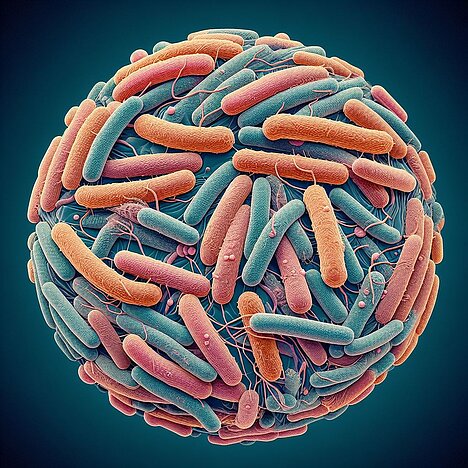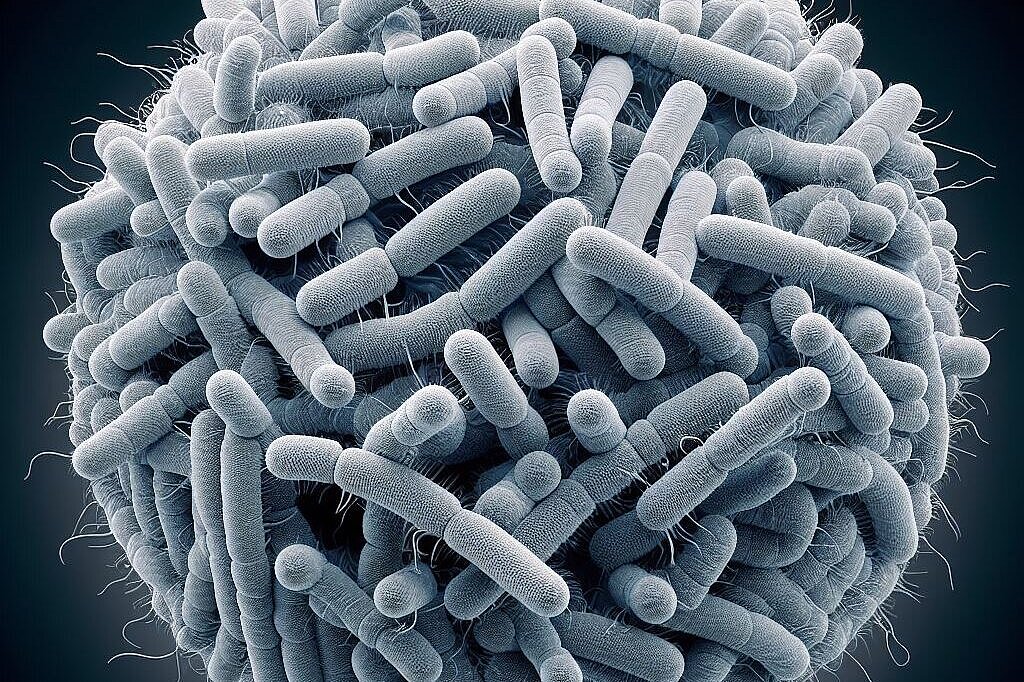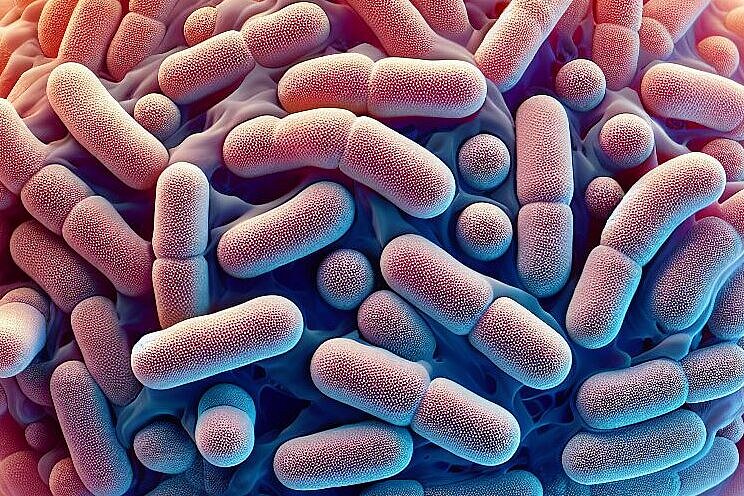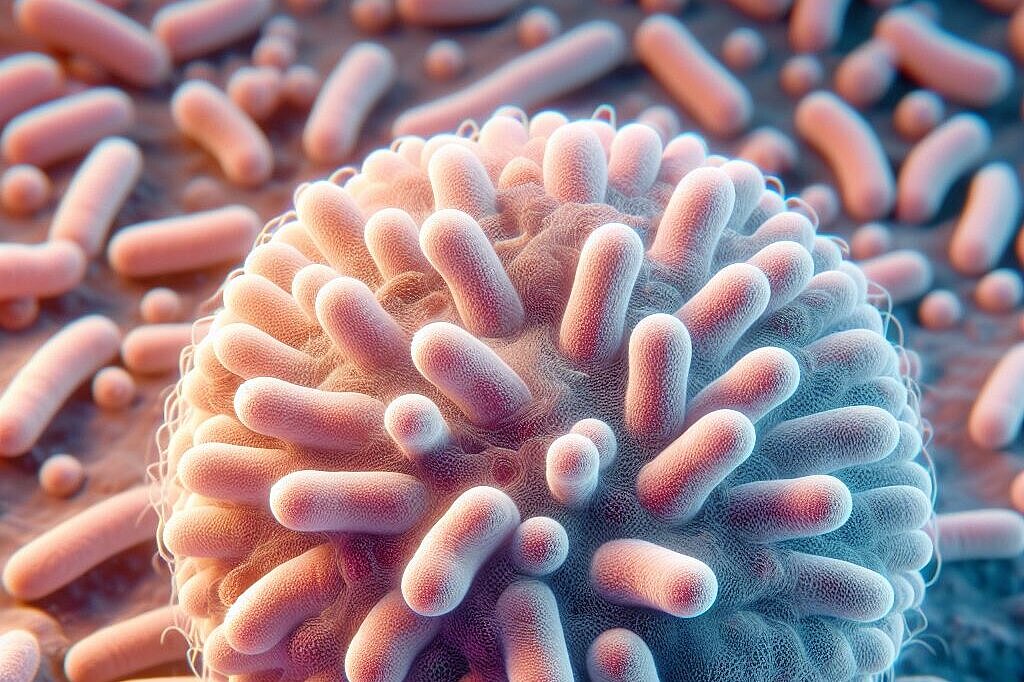Bacillus subtilis

What is Bacillus subtilis?
Bacillus subtilis is a rod-shaped bacterium that belongs to the genus Bacillus. It is a so-called spore-former, which means that it can form a protective shell around itself under unfavorable conditions and thus survive for a long time. This makes it very resistant to heat, cold, dryness and stomach acid. Bacillus subtilis occurs naturally in the soil and in the intestines of humans and animals. It is not pathogenic, but can even strengthen the immune system and support the intestinal flora.
How does Bacillus subtilis work in dogs?
Bacillus subtilis can have various positive effects in dogs:
- It promotes the growth of desirable intestinal bacteria such as lactobacilli and bifidobacteria, which are important for healthy digestion and a strong immune system.
- It inhibits the growth of harmful gut bacteria such as clostridia, salmonella or E. coli, which can cause diarrhea or other infections.
- It produces enzymes that can improve the digestion of carbohydrates, proteins and fats.
- It produces substances such as vitamins, amino acids and short-chain fatty acids, which are important for the health of intestinal cells and other organs.
- It stimulates the immune system by increasing the activity of phagocytes, antibodies and other defense cells.
- It protects the intestinal barrier by promoting the formation of mucus and the regeneration of intestinal cells.
When should Bacillus subtilis be used in dogs?
Bacillus subtilis can be useful in dogs in various situations:
- In acute or chronic digestive disorders such as diarrhea, flatulence or foul-smelling feces. Bacillus subtilis can stabilize the intestinal flora, improve the consistency of faeces and reduce the smell of faeces.
- During or after antibiotic therapy. Antibiotics can not only kill pathogenic bacteria, but also impair the beneficial intestinal bacteria. Bacillus subtilis can help to rebuild the intestinal flora and reduce the risk of secondary infections.
- For food intolerances or allergies. Bacillus subtilis can facilitate the digestion of difficult-to-digest food components and strengthen the intestinal barrier. This can lead to less inflammation in the intestines and throughout the body.
- During stress or high physical exertion. Stress can have a negative effect on intestinal activity and intestinal flora. Bacillus subtilis can prevent stress-induced diarrhea and increase stress resistance.
- In case of immune deficiency or tendency to excessive immune reactions. Bacillus subtilis can modulate the immune system by promoting both the defense against pathogens and tolerance to harmless substances.
How should Bacillus subtilis be administered to dogs?
Bacillus subtilis is available as a feed supplement for dogs, for example as a powder or capsules. The dosage depends on the weight of the dog and the product. It is important to follow the manufacturer's instructions and not to exceed the recommended amount. Bacillus subtilis can be mixed directly into the food or administered with a little water. It should not be heated, otherwise the bacteria may die. Bacillus subtilis can be used both short-term and long-term, depending on the dog's needs and condition. It is advisable to consult a vet before use to rule out possible interactions with other medications or illnesses.
What are the side effects of Bacillus subtilis in dogs?
Bacillus subtilis is considered to be very safe and well tolerated by dogs. No serious side effects are known. In rare cases, mild digestive complaints such as flatulence or soft stools may occur, but these usually disappear on their own. If the symptoms persist or worsen, use should be discontinued and a vet consulted.
Bacillus subtilis is a probiotic bacterium that can support the intestinal flora and immune system of dogs. It can help with various digestive problems, allergies, stress or immune deficiencies by promoting the growth of beneficial intestinal bacteria, inhibiting the growth of harmful intestinal bacteria, improving digestion, strengthening the intestinal barrier and modulating the immune system. Bacillus subtilis is available as a feed supplement for dogs and can be used both short-term and long-term. It is considered very safe and well tolerated, but in rare cases can cause mild digestive discomfort. A vet should be consulted before use to rule out possible interactions with other medications or illnesses.
Properties 8
Are you looking for other ingredients with a specific property?
Just click on them to find more.
If you notice any signs of hypersensitivity or poisoning in your dog, you should see your vet immediately. We are not a substitute for a vet, but we try to be as accurate as possible. Every dog reacts differently and we recommend you get a second opinion or consult your vet if in doubt.
Stay healthy and take good care of your four-legged friend!😊
Similar to Bacillus subtilis
Lactobacillus acidophilus is a type of bacteria that produces lactic acid. This lactic acid lowers the pH value in the intestine and thus inhibits the growth of harmful bacteria that can cause...
Bifidobacterium animalis is a rod-shaped bacterium that belongs to the genus Bifidobacterium. This genus includes several species of bacteria that occur naturally in the intestines of mammals, birds...
Streptococcus thermophilus is a gram-positive, spherical bacterium that belongs to the streptococcus family. It is a lactic acid bacterium, which means that it converts milk sugar (lactose) into...
Enterococcus faecium can help reduce digestive problems in dogs, such as diarrhea and constipation. It can help to restore the balance of intestinal flora and reduce inflammation in the gut, which...



